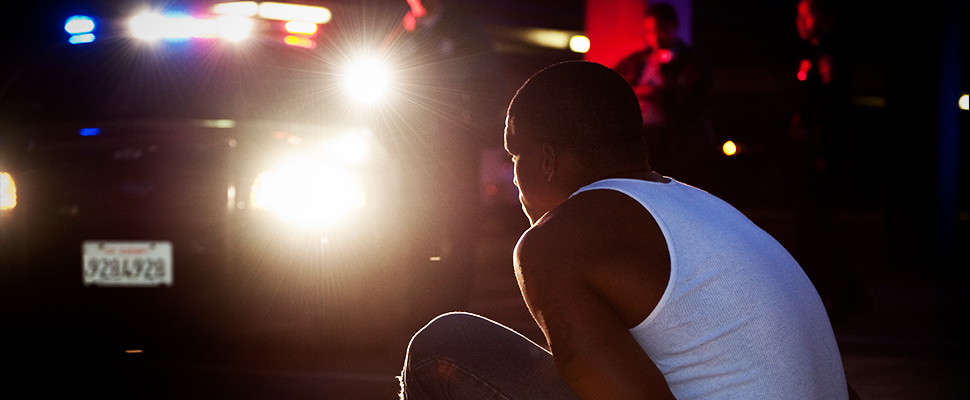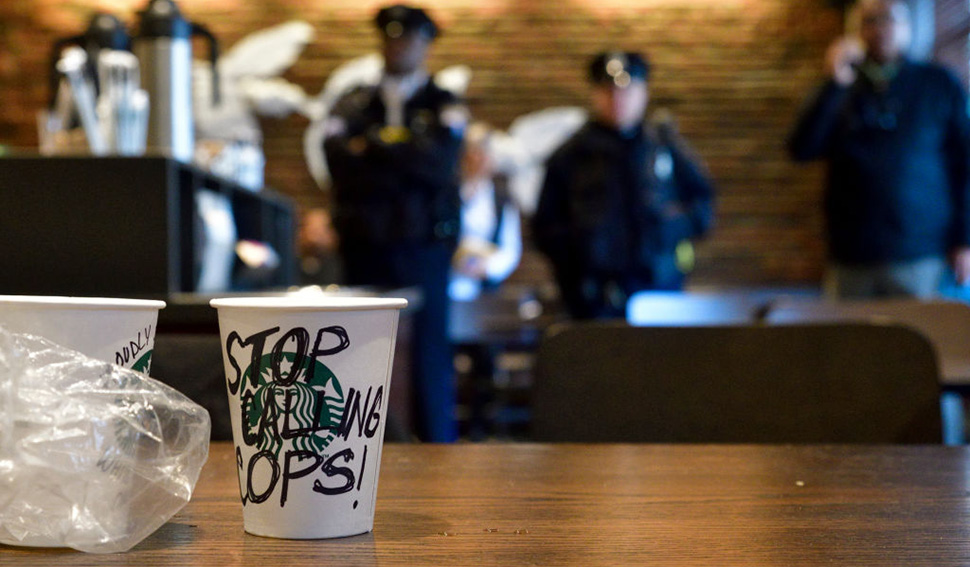
This is America: In recent weeks, black people have been arrested or unnecessarily detained by the police or campus security for “waiting for a friend in a coffee shop,” “grilling food in a park zoned for grilling food,” “leaving an AirBnB without smiling,” and “napping in a common room.” Meanwhile, last week two Native American students were pulled from a college tour (for which they pre-registered) because they were… being quiet? Wearing sweatshirts? It’s murky.
These activities are notable for how painfully mundane they are. Yet they led to officer involvement resulting from overzealous 911 calls — further examples of how the tectonic plates of race and police continually bang into each other, sending tremors through the nation. The incidents also underscore the propensity of white people to treat our civil services as personal valets, ready to assuage their discomfort whenever it arises. Considering the fact people of color pay their fair share of taxes, they are — in a very real sense — financing their own unnecessary harassment. They’re paying to have their hearts race while defending their perfectly commonplace behaviors with police at public parks, coffee shops, and outside short-term rentals.
So what should society do, when a significant number of irrational outliers puts financial stress on our civil services by wasting police time? Historically, we create laws. In this case, we’d vote in a law which would add an extra layer of filtration to the “should I call 911?” process and penalize egregious offenders of wrongful 911 calls. It would be an anti-“good Samaritan” law, so to speak — meant to dissuade people from confusing “discomfort based on learned prejudices” with “someone committing a crime.”
While the idea of a law against race-based 911 calls may sound wildly contentious, there’s plenty of precedent for it. Our nation actually has a strong system of penal codes set up to protect against abuses of the emergency response system. In Washington state, code 5.21.020 defines “Misuse of the 911 system” as: “A request for emergency response when no actual emergency exists and when the caller does not have a good faith basis to request emergency assistance.” In New Hampshire, a “deliberate misuse” of the 911 system needs to be in evidence. Most of the calls listed above would violate these laws without much alteration.
Meanwhile, the cost of violating the rule of “good faith” in dialing 911 is on the rise. In 2010, the state of Illinois made bad faith 911 calls (which fall under the state’s disorderly conduct statute) into a Class 4 felony, with up to three years of jail time. In California, false 911 calls are still a misdemeanor, but the sentencing cap for mobilizing emergency services was expanded from $1,000 to $10,000 in 2013. Laws prohibiting swatting are also rapidly expanding nationwide, with the proposed Online Saftey Modernization Act carrying a maximum sentence of 20 years in prison.
Would a person juggling their own biases with their understanding of criminality think twice before calling the police over two men sitting in a coffee shop if it might cost them money? Undoubtedly. Would it stop them from calling the police when — to the best of their knowledge — a real crime was being committed? Absolutely not. As it currently stands, a well-meaning intent is enough to prevent being penalized for a false 911 call and that wouldn’t be likely to change. Still, callers witnessing activities that they felt were “on the bubble” would potentially take their own prejudice into account if they might get a ticket for their call.
One meaningful component to recognize here, especially to the person whose political affiliations or feelings on race leave them resistant to this idea, is that taxpayers pay significant cash for wrongful use of the emergency response system. Police time and resources are compromised and it adds up quickly (dispatchers, officers, supervisors, media relations specialists answer to inquiries about how the hell “golfing too slowly” is a crime, etc). Those advocating for small government should be thrilled by the introduction of a penalty for costing the state money.
Is that the best reason for expanding penalties for race-motivated 911 calls? Nope. But if it strengthens the case, so be it.

The legal fine solution functions outside of the bigger implications involved when discussing race and police in America. The history of police violence against black and native citizens has turned even the simplest interaction into a fear-inducing moment for the people being questioned. Considering the media coverage of Michael Brown, Stephon Clark, Tamir Rice, Terence Crutcher, etc. it’s unfathomable that a white person deciding to call the police over something that simply irks them is not aware of this history. It’s therefore fair to note that a 911 call over “waiting for a friend” or “grilling in a park” carries a sinister undercurrent of creating clear and present danger for people of color.
Obviously, a penalty for racially motivated 911 calls won’t remedy the fractured relationship between marginalized people and the officers who are sworn to serve and protect them. But it would show that our nation takes matters of race seriously (or matters of wasting civic resources seriously, if that’s easier for you to swallow). It would be a clear stand that people can’t use taxpayer-funded civil servants as avatars to act out their biases. Even in the process of researching this article, the idea seems to have taken hold. Trevor Noah’s recent suggestion (below) is played for laughs but seems absolutely reasonable upon further consideration.
Creating an “ill will” law, resulting in even a $500 ticket would be a tiny step in our nation’s journey toward racial equity. There are much bigger steps that need to be taken. Plenty of them. But here, in 2018, such a law is completely warranted and of the essence.
